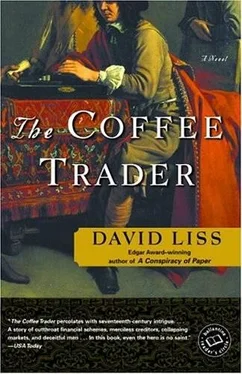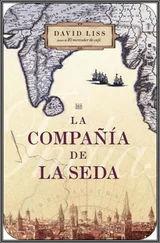“This is what I think,” she said, her voice hardly loud enough to rise above the din of the tavern. “Beer and wine may make a man sleepy, but coffee will make him awake and clearheaded. Beer and wine may make a man amorous, but coffee will make him lose interest in the flesh. The man who drinks coffee fruit cares only for his business.” She paused for another sip. “Coffee is the drink of commerce.”
How many times, conducting business in taverns, had Miguel’s wits suffered with each tankard of beer? How many times had he wished he had the concentration for another hour’s clarity with the week’s pricing sheets? A sobering drink was just the thing for a trading man.
An eagerness had begun to wash over Miguel, and he found his foot tapping impatiently. The sounds and sights of the tavern drifted away. There was nothing but Geertruid. And coffee. “Who now drinks it?” he asked.
“I hardly know,” Geertruid admitted. “I’ve heard there is a coffee tavern somewhere in the city-frequented by Turks, they say-but I’ve never seen it. I know of no Dutchmen who take coffee, unless it be prescribed by a physician, but the word will spread. Already, in England, taverns that serve coffee instead of wine and beer have opened, and men of trade flock to them to talk business. These coffee taverns become like exchanges unto themselves. It can’t be too long before those taverns open here as well, for what city loves commerce so well as Amsterdam?”
“Are you suggesting,” Miguel asked, “that you want to open a tavern?”
“The taverns are nothing. We must put ourselves in a position to supply them.” She took his hand. “The demand is coming, and if we prepare ourselves for that demand, we can make a great deal of money.”
The coffee’s scent began to make him light-headed with something like desire. No, not desire. Greed. Geertruid had stumbled upon something, and Miguel felt her infectious eagerness swelling in his chest. It was like panic or jubilance or something else, but he wanted to leap from his seat. Was this energy from the strength of her idea or the effect of the coffee? If coffee fruit made a man unable to keep from fidgeting, how could it be the drink of commerce?
Still, coffee was something marvelous, and if he could dare to hope that no one else in Amsterdam plotted to take advantage of this new drink, it could be the very thing to save him from ruin. For six dismal months, Miguel had at times felt himself in a waking dream. His life had been replaced with a sad imitation, with the bloodless life of a lesser man. Could coffee restore him to his rightful place?
He loved the money that came with success, but he loved the power more. He relished the respect he had commanded on the Exchange and in the Vlooyenburg, the island neighborhood where the Portuguese Jews lived. He loved hosting lavish dinners and never inquiring of the bill. He took pleasure in giving to the charitable boards. Here was money for the poor-let them eat. Here was money for the refugees-let them find homes. Here was money for the scholars in the Holy Land -let them work to bring in the age of the Messiah. The world could be a holier place because Miguel had money to give, and he gave it.
That was Miguel Lienzo, not this wretch at whose failings children and beefy housewives smirked. He could not much longer endure the anxious stares of other traders, who hurried away from him lest his ill fortune spread like plague, or the pitying looks from his brother’s pretty wife, whose moist eyes suggested she saw kinship between her misery and his.
Perhaps he had suffered enough, and the Holy One, blessed be He, had put this opportunity before him. Did he dare to believe that? Miguel wanted to agree to anything Geertruid proposed, but he had lost too many times in recent months for acting on foolish hunches. It would be madness to forge ahead, particularly when he would be plunging with a partner whose very existence would make him vulnerable to the Ma’amad.
“How is it that this magic potion has not swept through Europe already?” he asked.
“All things must begin somewhere. Must we wait,” she added in a conspiratorial voice, “until some other ambitious merchant learns its secret?”
Miguel pushed back from the counter and sat up straight. “Tell me what you propose.” He waited with startling hunger for Geertruid’s words; she could not answer quickly enough, and Miguel wanted to reply before the words had even been uttered.
Geertruid rubbed her long hands together. “I have determined to do some sort of business with coffee, and I have some capital, but I have no idea how to proceed. You are a man of business, and I need your help-and your partnership.”
It was one thing to call this high-spirited widow his friend when they were private together, to drink and gamble with her, to stand for her on the Exchange and make small trades now and again-despite the Ma’amad’s having forbidden Jews to broker for gentiles on pain of excommunication. It was another thing to take her as a partner in business. Some Jews might emerge unscathed from so unusual an arrangement, but Miguel could not count on his luck, not without money or influence to protect him.
Once Miguel had scoffed at the council’s humorless censures, but the Ma’amad had begun to carry out more of its threats. It sent its spies in pursuit of violators of the Sabbath and eaters of unclean food. It cast out those, like the usurer Alonzo Alferonda, who broke its arbitrary rules. It hounded those like poor Bento Spinoza, who uttered heresies so vague that almost no one even understood that his words were heretical. More than that, Miguel had an enemy on the council who surely only waited for the flimsiest excuse to strike.
So many risks. Miguel bit his lip, forcing back the urge to smirk. He could live with the risks if he could promise himself not to think of them too often.
Miguel began to tap the counter. He wanted to act immediately. He could begin at once to secure contacts and agents upon almost any important exchange in Europe. He could juggle coffee by the barrelful, moving it from this port to that. This was the true essence of Miguel Lienzo; he made deals and connections and arrangements. He was no coward to shrink from an opportunity because bitter and hypocritical men told him that they knew better than the Sages what was right and wrong.
“How shall we do this?” he said at last, suddenly aware he had not spoken for several minutes. “The coffee-fruit trade belongs to the East India Company, and we can’t hope to take control away from men of their power. I don’t understand what you’re proposing.”
“Nor do I!” Geertruid threw her hands into the air excitedly. “But I am proposing something . We must do something . I won’t allow the fact that I do not know what I am proposing stand in my way. As they say, even the blind may stumble upon Heaven. You worry about the twentieth-you owe money? I am offering you riches. A great new venture with which to rebuild and make your current debt seem trivial.”
“I’ll need time to think about it,” he told her, though he needed nothing of the kind. A man does not get many such opportunities in his life, and to ruin his chances out of impatience would be madness. “We’ll discuss these things again after the twentieth. In a week.”
“A week is a long time,” the widow said thoughtfully. “Fortunes are made in a week. Empires rise and fall in a week.”
“I need a week,” Miguel repeated softly.
“A week, then,” Geertruid said, in her amiable way. She knew not to push further.
Miguel realized he had been fidgeting with the buttons of his coat. “And now I must leave and tend to my more immediate concerns.”
“Before you go, let me give you something to help you consider the enterprise.” Geertruid signaled to Crispijn, who hurried over and set down before her a rough woolen sack.
Читать дальше












